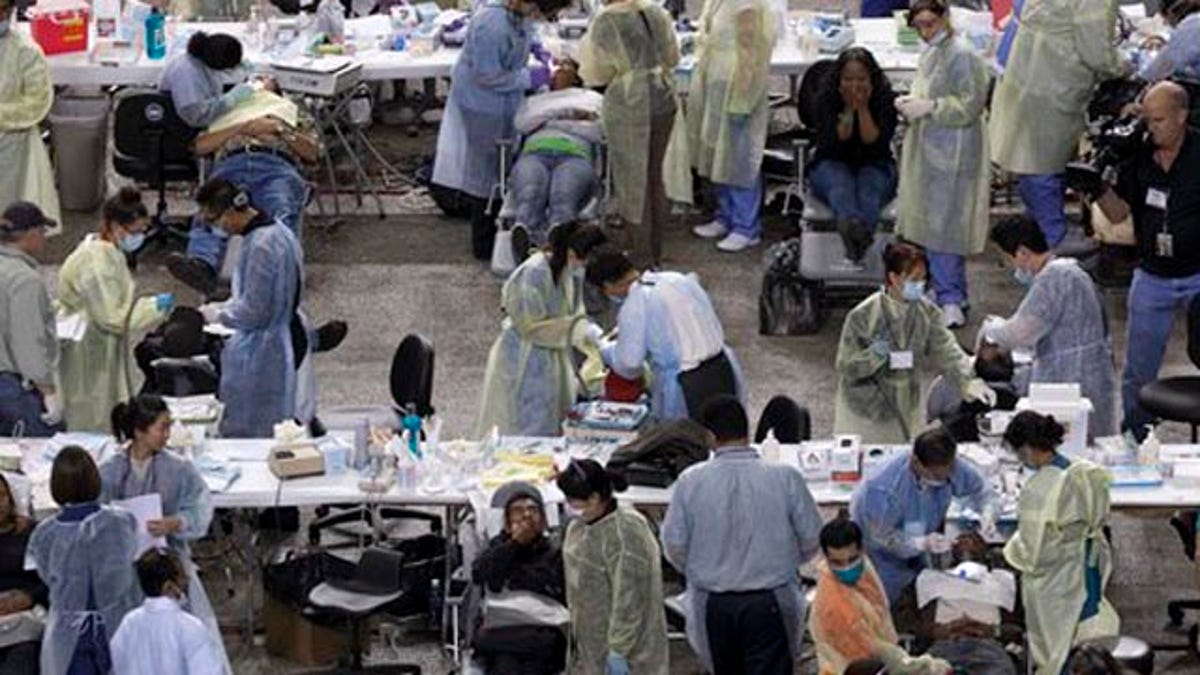
October 20, 2011: Patients receive free dental care at a free health clinic sponsored by CareNow at the Los Angeles Sports Arena. (AP)
LOS ANGELES – Avery Shapiro has had tooth pain for several years. Pat Morris' dental insurance wouldn't cover the tab for a filling. Chenell Bass had to stop driving because her eyesight got so weak.
Such stories were typical among the first 1,200 people filing into a huge free medical clinic that opened Thursday at the Los Angeles Sports Arena.
The four-day clinic, organized by Los Angeles-based nonprofit CareNow, is expected to draw 5,000 uninsured and underinsured patients who spent hours in line Monday to obtain wristbands to enter the event. Some even camped out overnight.
It's the fourth such event that CareNow has organized around Los Angeles County with the help of 800 medical professionals volunteering their services, and supplies and equipment donated by manufacturers.
"We hope to keep doing these until we're obsolete," said CareNow President Don Manelli. "There are 2 million uninsured in L.A. County. We're doing what we can do."
At all the clinics, dental treatment is the overwhelming request followed by vision care. "If you have a toothache, there's no ER to go to," Manelli said. "About 60 percent ask for dental care."
The buzz of dental drills cut above the hum of voices on the floor of the arena where dozens of dentists worked on patients in makeshift dental chairs in assembly line fashion. Their instruments sat on rows of folding tables behind them.
For 26-year-old Shapiro, who had to move into a homeless shelter after losing her job as a nanny three years ago, getting her tooth fixed was worth standing in line for almost seven hours earlier this week to receive a wristband to enter the clinic.
"It's a lot of waiting but I'm grateful they have this," she said. "I just don't have the money to pay for it."
Others said they had minimal dental insurance or health insurance that didn't cover dental or vision care.
Pat Morris, a 60-year-old retired phone company worker, said she can get cleanings and X-rays under her health benefits, but that's it. When her dentist found a cavity, she couldn't afford the $300 to fill it. "That's just for one tooth," she said. "I'm on a fixed income."
For Dr. Lillian Gelberg, a family medicine professor at University of California Los Angeles, the mass clinic demonstrates the cracks in the medical system. "We need to get everybody insured," she said.
Physicians attended to patients in curtained cubicles that served as consulting rooms. Many people were there for symptoms of chronic diseases, such as diabetes and hypertension. Foot ills were another big complaint.
Many poor people find ways of coping with maladies until they worsen to a point when they are in pain or can no longer compensate, said internist Monya De, who was volunteering her services. "Treatment doesn't seem like an option to them," she said.
This year, CareNow has lined up about 40 clinics to provide free follow-up care to the patients. "Our goal is to make sure people in line this year don't have to be in line next year," Manelli said. "Now there's continuity of care."
The organization is also pushing prevention harder this year. Booths offered preventive procedures such as mammograms, Pap smears and vaccinations, as well as information on smoking cessation, nutrition, and government assistance programs.
On the other side of the arena, patients waited for their number to be called for eye exams and free glasses. After queuing up six hours to get a wristband on Monday, Chenell Bass took two buses to get her eyes examined on Thursday.
The waits of hours were nothing -- she's been waiting to get glasses for five years because she can't afford them.
"Not being able to see is terrible. I can't read anymore, and I love to read. I can't drive," said the 52-year-old former housecleaner who lives on disability for a bad back. "This is a blessing."

